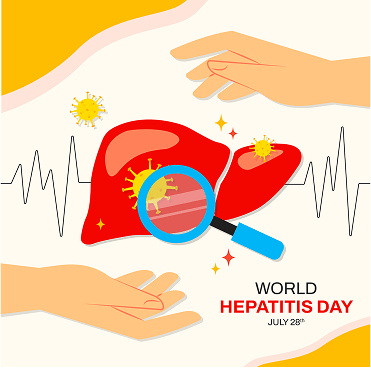Hepatitis is a word that’s often thrown around casually, but it’s one that deserves serious attention.
Simply put, hepatitis means inflammation of the liver. It can be caused by viruses, alcohol, medications, or even autoimmune conditions. The tricky part? Many people don’t realize they have it until their liver is already damaged.
Let’s break down what hepatitis really is, the types you should know about, how doctors test for it, and what you can do to prevent it.
The Major Types of Hepatitis
1. Hepatitis A (HAV)
Often called “food-borne hepatitis,” Hepatitis A spreads through contaminated food or water. It’s an acute infection, meaning it doesn’t become chronic. Most people recover fully with rest and supportive care.
Key prevention tip: Maintain good hygiene and get vaccinated.
2. Hepatitis B (HBV)
This one is a global concern. Hepatitis B spreads through blood and body fluids, often via unprotected sex, shared needles, or from mother to baby during birth. Unlike Hepatitis A, HBV can become chronic and cause long-term liver damage or cancer.
Key prevention tip: Get vaccinated. The HBV vaccine is one of the most effective in the world.
3. Hepatitis C (HCV)
Known as the “silent infection,” Hepatitis C often doesn’t show symptoms for years. It spreads mainly through infected blood, making it common among people with a history of blood transfusions before 1992 or unsafe needle use.
Key prevention tip: Avoid sharing needles and ensure all blood products are screened.
4. Hepatitis D (HDV)
This rare form only occurs in people already infected with Hepatitis B. It makes HBV infections more severe and harder to treat.
Key prevention tip: Preventing Hepatitis B automatically prevents Hepatitis D.
5. Hepatitis E (HEV)
Similar to Hepatitis A, this one spreads through contaminated water. It’s usually acute and self-limiting, though it can be serious in pregnant women.
Key prevention tip: Drink safe, filtered, or boiled water.

Common Tests to Detect Hepatitis
Doctors use a mix of blood tests and imaging studies to confirm hepatitis and assess liver health. Here are the main ones:
- Liver Function Test (LFT): Measures enzymes like ALT and AST to check for liver inflammation or damage.
- Viral Antigen and Antibody Tests: Detect the presence of specific hepatitis viruses (A, B, C, D, or E).
- PCR (Polymerase Chain Reaction) Test: Looks for the virus’s genetic material to determine if the infection is active.
- Ultrasound or FibroScan: Helps detect scarring or cirrhosis in chronic cases.
Getting tested early is the best way to manage or even reverse damage before it becomes serious.
Prevention: Protecting Yourself and Others
The good news? Most forms of hepatitis can be prevented with simple lifestyle changes and awareness.
- Get vaccinated for Hepatitis A and B.
- Avoid sharing razors, needles, or toothbrushes.
- Drink clean water and eat hygienic food.
- Avoid excessive alcohol consumption, which worsens liver inflammation.
- Get regular check-ups if you have risk factors or chronic conditions.
Your liver is the body’s detox hub, quietly doing its job every single day.
Hepatitis can disrupt that balance in ways you might not notice until it’s too late.
So if you’ve never been tested or vaccinated, there’s no better time than now. Prevention is simple, but neglect is costly.
Latest News & Blogs

Respiratory Health: How Pollution Affects Your Lungs
Respiratory Health: How Pollution Affects Your Lungs | Protect Your Lungs Today

Foods That Can Trigger Inflammation and Joint Pain
Foods That Can Trigger Inflammation and Joint Pain

The Role of Mental Health in Chronic Pain Recovery
Mental Health and Chronic Pain Recovery: Why Mind Matters



